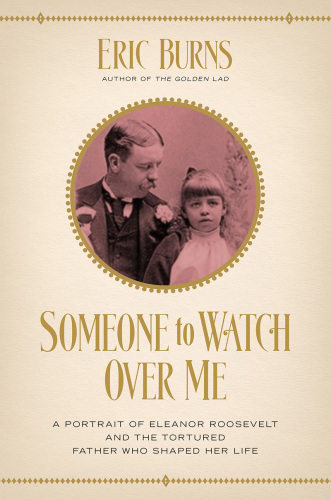
Someone to Watch Over Me
- اطلاعات
- نقد و بررسی
- دیدگاه کاربران
نقد و بررسی

Starred review from January 30, 2017
In his second biography about the Roosevelt family, Burns (A Golden Lad) focuses on the beautiful yet tragic relationship between Eleanor Roosevelt and Elliott Bulloch Roosevelt, her father and the charming younger brother of Theodore Roosevelt. Elliott and his wife, Anna Rebecca Ludlow Hall, were a well-known and attractive couple. Eleanor was a disappointment to her mother, but to Elliott she was “a miracle from heaven.” Where Anna was cold and indifferent toward Eleanor, Elliott was warm and loving, introducing Eleanor at an early age to the charity work that would serve her well into her final days. Unfortunately, Elliott was absent for most of Eleanor’s childhood. He drank heavily, suffered from severe seizures that may have been the result of his drinking, and was addicted to morphine and laudanum. Burns chronicles several failed attempts to send Elliott into rehab, a string of extramarital affairs, and an illegitimate son; eventually Theodore exiled Elliott to Virginia. Elliott and Eleanor constantly wrote to each other, and though Elliott died when Eleanor was only 10 years old, she kept their letters for the rest of her life. Burns’s work is captivating, suspenseful, and heartbreaking; this is how biographies should be written. Agent: Linda Konner, Linda Konner Literary.

January 1, 2017
An exploration of Eleanor Roosevelt (1884-1962) and her idealization of the father she hardly knew.In her autobiography, Eleanor wrote that her father "dominated my life as long as he lived" and "was the love of my life for many years after he died." TV journalist and social historian Burns (The Golden Lad: The Haunting Story of Quentin and Theodore Roosevelt, 2016, etc.) makes much of that statement, claiming that Elliott Bulloch Roosevelt (1860-1894), Theodore's younger brother, "influenced her character more than anyone else ever did" and therefore deserves "the most prominent role he has yet known in a book." Unfortunately, the author is mostly unpersuasive about Elliott's influence and in his depiction of the "bond" between father and daughter. Burns draws his information largely from Roosevelt biographies by Joseph Lash, Blanche Wiesen Cook, David McCullough, and others and by a cache of letters between Eleanor and Elliott, written over two years, ending with his death when Eleanor was 10. Elliott was a tormented man, moody, depressed, and beset by demons. By the time he married, he was a "full-fledged alcoholic," and as the years passed, he became addicted, as well, to laudanum and morphine. During Eleanor's childhood, he was institutionalized several times--dramatic events kept from his daughter--but never cured. He had at least three affairs, one resulting in the birth of a son, and was estranged from his wife and family. Biographers acknowledge that when he was sober, he was a loving parent, far more so than Eleanor's cold, dismissive mother, but he was hardly involved in her upbringing. From Burns' evidence, the man she loved was largely imaginary. The author makes the odd decision to organize the dual biography in nonchronological leaps of time to prove that "theirs was a relationship for the ages." But the alternating chapters offer a familiar portrait of Eleanor, underscoring how vastly different she was from her father. A new light on the Roosevelt clan that serves as illumination of the short life of an unhappy man.
COPYRIGHT(2017) Kirkus Reviews, ALL RIGHTS RESERVED.

February 15, 2017
From 1892 to 1894, Elliott Roosevelt, the younger brother of Theodore Roosevelt Sr., exchanged letters with his daughter and future first lady Eleanor Roosevelt, before dying at the age of 34. Eleanor was almost ten, having recently experienced the deaths of her younger brother and indifferent mother. Her father, who struggled with alcohol and drug addiction, was in exile from his family, a state forced on him by Theodore to mitigate the embarrassment caused by Elliott's scandalous behavior. Burns (The Golden Lad) claims that no biography of Eleanor duly emphasizes Elliott's profound influence on her life. Using personal letters and the little information that is known of his relationship with Eleanor (Burns quotes heavily from biographies and articles), the author underscores the crucial connection between her success and idolization of her father. He displayed abiding, unconditional love and forgiveness, encouraging her to be courageous, studious, and to persevere. For Eleanor, he demonstrated humility, tenderness, and generosity, serving as her only joy in childhood and lifelong inspiration. VERDICT Focusing primarily on Elliott's impact on his daughter's character and outstanding accomplishments, this biography should be read alongside a thorough study of Eleanor, such as Blanche Wiesen Cook's three-volume Eleanor Roosevelt, to fill in the gaps.--Margaret Kappanadze, Elmira Coll. Lib., NY
Copyright 2017 Library Journal, LLC Used with permission.




دیدگاه کاربران